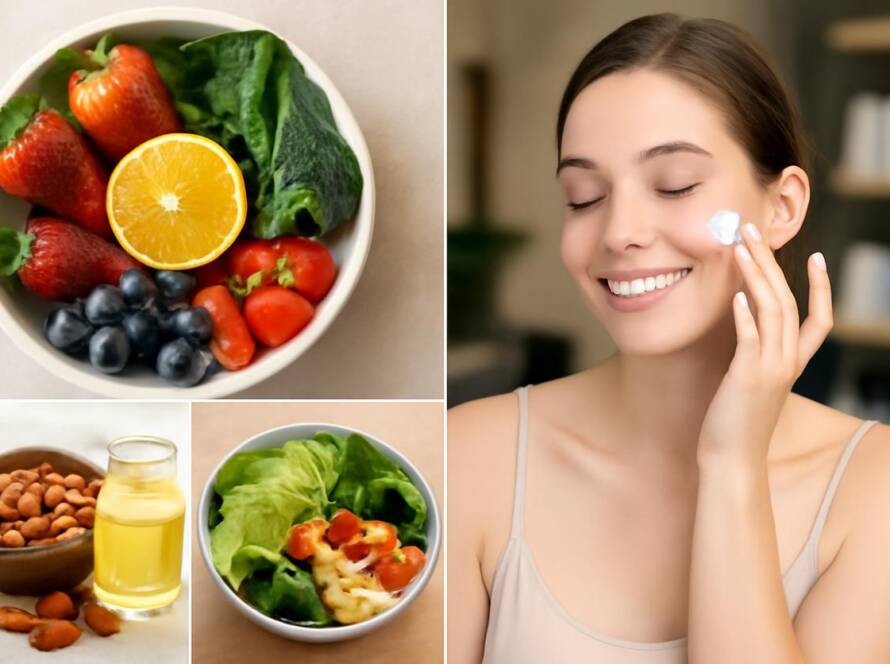Table of Contents
- Nourish Your Glow: Why Your Diet is Your Best Skincare Product
- The A-List: Major Vitamins and Minerals for Your Skin
- Reading the Signs: How Nutrient Deficiencies Appear on Your Skin
- Your Skin’s Grocery List: Top Foods for Essential Nutrients
- A Day of Eating for Radiant Skin
- Smart Pairings: Timing and Combining Nutrients for Better Absorption
- Navigating Supplements: When and How to Consider Them
- The Inside-Out Approach: Combining Your Diet with Topical Care
- Practical Tips for Boosting Nutrient Bioavailability
- When to Consult a Professional
- Quick Reference Guide: Key Nutrients for Skin Health
- Further Reading and Resources
Nourish Your Glow: Why Your Diet is Your Best Skincare Product
We often invest in serums, creams, and cleansers to achieve a radiant complexion, but the foundation of vibrant skin is built from within. What you eat directly impacts your skin’s texture, elasticity, and overall health. The right combination of vitamins for healthy skin acts as an internal skincare routine, working to repair damage, build strong cells, and protect against environmental stressors. Think of your plate as your most powerful tool for achieving that natural, healthy glow.
This practical guide takes a meal-centric approach, moving beyond a simple list of nutrients. We will explore how specific vitamins function, how to get them through delicious whole foods, and how to structure your meals for maximum benefit. Adopting these nutritional strategies in 2025 and beyond is about creating sustainable habits that nourish your body’s largest organ, revealing healthier, more resilient skin over time.
The A-List: Major Vitamins and Minerals for Your Skin
Certain nutrients are true powerhouses when it comes to skin health. Understanding their roles can help you make more intentional food choices. Here are the key players in the world of vitamins for healthy skin.
Vitamin A: The Repair and Renewal Expert
Vitamin A is crucial for cell turnover, a process where old skin cells are shed and replaced by new, healthy ones. This keeps your skin smooth and prevents pores from clogging. It also plays a role in repairing skin damage from the sun and supporting the skin’s immune function. There are two main forms: retinoids (from animal sources) and carotenoids like beta-carotene (from plants), which the body converts to Vitamin A.
- Role: Promotes cell growth and repair.
- Benefit: Helps prevent acne, reduces fine lines, and supports an even skin tone.
Vitamin C: The Master Antioxidant and Collagen Builder
A true skincare superstar, Vitamin C is essential for producing collagen, the protein that gives skin its firmness and elasticity. As a potent antioxidant, it helps protect your skin from damage caused by free radicals—unstable molecules from UV radiation and pollution. This protection can help prevent premature aging and dark spots. Getting enough of this vitamin is a cornerstone of any diet focused on vitamins for healthy skin.
- Role: Essential for collagen synthesis and antioxidant protection.
- Benefit: Fights sun damage, brightens the complexion, and firms the skin.
Vitamin D: The Skin Protector and Soother
Often called the “sunshine vitamin,” Vitamin D is vital for skin protection and rejuvenation. It contributes to skin cell growth, repair, and metabolism, while also strengthening the skin’s immune system. Its anti-inflammatory properties can be beneficial for calming conditions like acne and eczema.
- Role: Supports skin cell turnover and immune function.
- Benefit: Helps soothe inflammation and protect the skin barrier.
Vitamin E: The Hydrating Guardian
Vitamin E is another powerful antioxidant that works in tandem with Vitamin C to protect the skin from oxidative stress. It is particularly effective at preventing UV-induced free radical damage. As a fat-soluble vitamin, it also helps strengthen the skin barrier, locking in moisture and keeping skin hydrated and soft.
- Role: Antioxidant and skin barrier support.
- Benefit: Protects against sun damage and keeps skin moisturized.
Zinc and Selenium: The Mineral Defenders
Minerals are just as important as vitamins. Zinc is a master of healing, playing a key role in controlling inflammation and regulating oil production, making it crucial for those with acne-prone skin. Selenium is an antioxidant mineral that helps protect skin cells from damage and preserves skin elasticity.
- Role: Anti-inflammatory, wound healing, and antioxidant functions.
- Benefit: Zinc can help manage acne, while selenium protects against environmental damage.
Omega-3 Fatty Acids: The Ultimate Moisturizers
While not a vitamin, Omega-3 fatty acids are essential for a healthy skin barrier. They help regulate oil production, keep skin hydrated, and have potent anti-inflammatory effects. A diet rich in Omega-3s can lead to a plumper, more moisturized complexion and can help soothe inflammatory skin conditions.
- Role: Maintain the skin barrier and reduce inflammation.
- Benefit: Boosts hydration, calms redness, and supports overall skin health.
Reading the Signs: How Nutrient Deficiencies Appear on Your Skin
Your skin often provides the first clues that your diet may be lacking in key nutrients. Paying attention to these signals can help you adjust your intake of vitamins for healthy skin.
- Dry, Scaly Skin: Could indicate a deficiency in Vitamin A or Omega-3 fatty acids.
- Slow Wound Healing: May point to low levels of Vitamin C or Zinc, both crucial for repair.
- Easy Bruising: Often linked to insufficient Vitamin C, which is vital for strong blood vessel walls and collagen.
- Premature Wrinkles: A diet low in antioxidants like Vitamins A, C, and E can accelerate skin aging.
- Acne or Oily Skin: Can sometimes be exacerbated by low levels of Zinc, which helps regulate oil glands.
Your Skin’s Grocery List: Top Foods for Essential Nutrients
Eating a varied, whole-foods diet is the best way to get a broad spectrum of skin-supporting nutrients. Here’s where to find the good stuff:
- Vitamin A (Beta-Carotene): Sweet potatoes, carrots, spinach, kale, mangoes, and bell peppers.
- Vitamin C: Citrus fruits (oranges, lemons), strawberries, bell peppers, broccoli, and kiwi.
- Vitamin D: Fatty fish (salmon, mackerel), fortified milk and plant milks, and egg yolks.
- Vitamin E: Sunflower seeds, almonds, avocados, and spinach.
- Zinc: Oysters, beef, pumpkin seeds, lentils, and chickpeas.
- Selenium: Brazil nuts (just one or two a day is enough), tuna, and whole wheat bread.
- Omega-3 Fatty Acids: Salmon, mackerel, walnuts, chia seeds, and flaxseeds.
A Day of Eating for Radiant Skin
Here’s what a day focused on providing vitamins for healthy skin might look like. This menu is designed to deliver a variety of the key nutrients we’ve discussed.
- Breakfast: Oatmeal with Berries, Nuts, and Seeds. Oats provide complex carbs and fiber, while berries (strawberries, blueberries) deliver a powerful dose of Vitamin C. Top with walnuts (Omega-3s) and sunflower seeds (Vitamin E) for a complete, skin-loving start.
- Lunch: Large Kale Salad with Grilled Salmon and Lemon-Tahini Dressing. Kale is packed with Vitamin A and C. Salmon offers a fantastic source of Omega-3s and Vitamin D. The lemon in the dressing adds more Vitamin C and helps you absorb iron from the kale.
- Afternoon Snack: Greek Yogurt with a Handful of Almonds. Yogurt provides probiotics for gut health (which is linked to skin health), while almonds deliver a healthy dose of Vitamin E.
- Dinner: Lentil and Sweet Potato Curry. Lentils are an excellent source of Zinc, while sweet potatoes are a beta-carotene superstar (Vitamin A). Cooking it with spices like turmeric adds anti-inflammatory benefits. Serve with a side of steamed broccoli for an extra Vitamin C boost.
Smart Pairings: Timing and Combining Nutrients for Better Absorption
Getting nutrients into your body is one thing; making sure your body can use them is another. Smart food pairings can significantly increase nutrient absorption.
- Pair Fat-Soluble Vitamins with Healthy Fats: Vitamins A, D, and E are fat-soluble. Eat them with a source of fat to ensure they are absorbed. For example, drizzle olive oil on your salad with carrots and spinach, or eat avocado with your sweet potatoes.
- Combine Vitamin C with Plant-Based Iron: Vitamin C dramatically enhances the absorption of iron from plant sources like spinach and lentils. Squeeze lemon juice over a lentil soup or a spinach salad.
- Avoid Calcium with Iron-Heavy Meals: Calcium can interfere with iron absorption. If you’re eating an iron-rich meal, consider having your glass of milk or calcium supplement at a different time.
Navigating Supplements: When and How to Consider Them
A food-first approach is always best for obtaining vitamins for healthy skin. However, supplements may be beneficial for individuals with diagnosed deficiencies, dietary restrictions, or specific health conditions. Always consult a healthcare professional before starting any new supplement.
If you and your doctor decide a supplement is right for you, look for these signs of quality:
- Third-Party Testing: Look for certifications from organizations like USP, NSF, or ConsumerLab, which verify that the product contains what it claims and is free from contaminants.
- Appropriate Dosage: More is not always better. Excessive doses of certain vitamins can be toxic. Follow the guidance of your healthcare provider.
- Bioavailable Forms: Some nutrient forms are more easily absorbed than others. A registered dietitian or doctor can recommend the best forms for your needs.
The Inside-Out Approach: Combining Your Diet with Topical Care
For truly remarkable skin, a holistic approach is key. A nutrient-dense diet works synergistically with a consistent topical skincare routine. The vitamins for healthy skin you consume help build strong, resilient cells from the inside, while topical products deliver concentrated ingredients to the surface.
For instance, eating Vitamin C-rich foods helps your body produce collagen, while a topical Vitamin C serum can provide targeted antioxidant protection on the skin’s surface. This dual strategy ensures your skin is supported at every level.
Practical Tips for Boosting Nutrient Bioavailability
Bioavailability refers to the proportion of a nutrient that is absorbed and utilized by the body. Here are some simple ways to enhance it:
- Cook Certain Vegetables: Lightly cooking vegetables like carrots and tomatoes can break down their tough cell walls, making nutrients like beta-carotene and lycopene more available.
- Soak and Sprout Legumes and Grains: This process can reduce phytates, compounds that can bind to minerals like zinc and iron and inhibit their absorption.
- Chew Your Food Thoroughly: Digestion begins in the mouth. Chewing well helps break down food, increasing the surface area for digestive enzymes to work their magic.
When to Consult a Professional
While diet can significantly improve skin health, it is not a cure-all. It is important to seek professional medical advice if you experience:
- Persistent skin conditions like severe acne, eczema, or psoriasis.
- Sudden and unexplained changes in your skin.
- Suspected food allergies or intolerances that may be affecting your skin.
A dermatologist can diagnose underlying conditions, while a registered dietitian can provide personalized dietary guidance and test for nutrient deficiencies.
Quick Reference Guide: Key Nutrients for Skin Health
| Nutrient | Primary Skin Role | Top Food Sources |
|---|---|---|
| Vitamin A | Cell turnover and repair | Sweet potatoes, carrots, spinach |
| Vitamin C | Collagen production, antioxidant | Bell peppers, strawberries, citrus |
| Vitamin D | Skin immunity and cell growth | Salmon, fortified milk, egg yolks |
| Vitamin E | Antioxidant, moisture barrier | Sunflower seeds, almonds, avocado |
| Zinc | Anti-inflammatory, healing | Oysters, beef, lentils, pumpkin seeds |
| Omega-3s | Hydration, anti-inflammatory | Salmon, walnuts, flaxseeds |
Further Reading and Resources
For more evidence-based information on nutrition and skin health, explore these trusted sources:
- Vitamin A Factsheet for Consumers from the National Institutes of Health (NIH)
- Vitamin C Factsheet for Consumers from the NIH
- Vitamin D Factsheet for Consumers from the NIH
- Zinc Factsheet for Consumers from the NIH
- Omega-3 Fatty Acids Factsheet for Consumers from the NIH
- PubMed for access to primary research on skin nutrition.
- American Academy of Dermatology (AAD) for expert advice on skin conditions.



